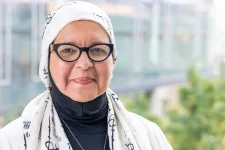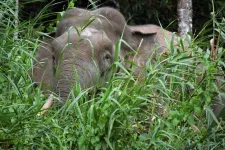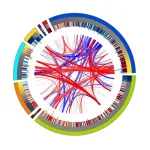(Press-News.org) Mona Diab understands what is at stake.
As a research scientist at two of the largest technology companies on the planet, Diab saw the impact innovations had as they spread across the globe. And with artificial intelligence poised to usher in the greatest technological leap since the internet, Diab wants to train, teach and prepare students, researchers, scientists and communities to think responsibly about these new tools.
"We're living in a world of proliferating AI and generative AI. There is so much at stake," Diab said. "We are at an inflection point for this technology and the discipline as a whole. It is a critical time to take into account its impact and sustainability."
Diab takes the reins of Carnegie Mellon University's Language Technologies Institute (LTI) this month. Part of CMU's School of Computer Science, the institute is home to cutting-edge research into the large language models powering the recent wave of generative AI systems and has a history of developing systems that have changed how computers understand and interact with humanity.
For Diab, AI researchers, scientists and students must consider issues ranging from security, privacy and accountability to diversity, equity and inclusion. They need to ask questions about climate and culture alongside questions about ones and zeros. Diab coined this the "responsible thinking" approach, and she wants the LTI to embrace it as fully as critical and computational thinking.
"Responsible thinking needs to become core to our work. It should shape the future of language technologies and AI at large" Diab said.
Diab joins CMU from Meta, where she was the lead responsible AI scientist. Before Meta, Diab worked as a principal scientist at Amazon Web Services and was a professor at George Washington University, where she founded the CARE4Lang lab. She is a globally renowned expert on Arabic natural language processing (NLP), multilingual processing and computational social sciences. She earned a doctorate in computational linguistics from the University of Maryland and a master's degree in computer science from George Washington University.
She majored in computer science and Egyptology with undergraduate degrees from The American University and Helwan University, both in Cairo. Diab blends both of those majors in a research thrust using NLP technology to build tools to read and reconstruct hieroglyphics in hopes of opening the field to more people and gaining new insights into history.
CMU's trailblazing research and top AI and computer science programs and talent drew Diab to the university. She said there is no better place to affect the development and use of the next generation of technology than the School of Computer Science.
Diab believes there is a gap in the current workforce, as it doesn't cater to what the current technology needs. To fill that gap, she wants to instigate a strong student-centric paradigm shift at CMU, to sustain excellence in both research and pedagogy. She aspires to train the best possible talent and transform the LTI into a leader in responsible thinking. With top faculty training top students who go on to secure top positions in industry and academia, the institute is positioned to snowball a responsible posture toward AI.
"Mona Diab's relentless pursuit of responsible AI in both academia and industry will strengthen the work of the Language Technologies Institute, School of Computer Science and Carnegie Mellon University as we seek to empower future generations of AI talent and develop a new wave of transformative technologies in an ethical, fair and sustainable manner," said Martial Hebert, dean of the School of Computer Science. "We are thrilled to have Mona's expertise and passion at CMU and excited to work with her on her vision."
Diab wants to proactively build the responsible AI framework into technology from the onset to avoid potential cultural harm as it spreads across the globe. She saw these harms as social media platforms spread to other countries, where Western-built platforms couldn't accommodate the nuances of different cultures.
Her work at Meta changed how the company handled Arabic, challenging the company to abandon the previous notion that it was a monolithic language and instead acknowledge the rich and diverse variants spoken around the world. That broader understanding helped Meta better grasp the language, leading to better translations, better identification of hate speech and a better user experience.
"I'm Muslim and I'm Arab, and I'm concerned that a lot of this technology is going to be adopted blindly," Diab said. "We must embed the technology with the right frameworks and build systems that are culturally aware and culturally responsible."
Diab advocates for computer scientists to work alongside social scientists. Anthropologists, sociologists, ethicists and others can help AI engineers think about problems from culturally different points of view and tune those systems to improve them. But this is not a one-way street. Diab believes that the relevant social sciences can also benefit from working with computer scientists.
Developing AI technology must also happen with the people it intends to serve, and feedback from that population should guide evaluations.
"It's in our interest to learn from them and assess the success of our systems with them," Diab said. "Developing these strong collaborative initiatives and outreach will benefit all of humanity."
She strongly advocates for effective diversity and inclusion and welcoming everyone equally in the scientific landscape. It is critical to the sustainability of the scientific enterprise.
Diab will be the LTI's second full-time director. The institute's founder and first director, Jaime Carbonell, died in February 2020. Professors Jamie Callan and Carolyn Rosé have served as interim directors.
The LTI, world-renowned for its pioneering work on natural language processing, machine translation, speech recognition and large language models, was founded in 1986 as the Center for Machine Translation and changed its name in 1996. The institute offers a Ph.D. in language and information technology, and master's degrees in language technologies, intelligent information systems, computational data science, and artificial intelligence and innovation. Undergraduates can complete a concentration in language technologies. The institute has 28 core faculty members, a staff of 41 including post-doctoral researchers, and 461 students.
More information about the Language Technologies Institute is available on its website.
END
Carnegie Mellon University announces new Director of the Language Technologies Institute
Mona Diab has eyes set on changing how to think about AI
2023-08-23
ELSE PRESS RELEASES FROM THIS DATE:
Planning algorithm enables high-performance flight
2023-08-23
A tailsitter is a fixed-wing aircraft that takes off and lands vertically (it sits on its tail on the landing pad), and then tilts horizontally for forward flight. Faster and more efficient than quadcopter drones, these versatile aircraft can fly over a large area like an airplane but also hover like a helicopter, making them well-suited for tasks like search-and-rescue or parcel delivery.
MIT researchers have developed new algorithms for trajectory planning and control of a tailsitter that take advantage of the maneuverability and versatility of this type of aircraft. Their algorithms ...
Clinical trial studying possible new treatment option for patients with NAFLD
2023-08-23
According to the National Institutes of Health, approximately 24% of adults in the United States have nonalcoholic fatty liver disease (NAFLD), an umbrella term for a range of liver conditions affecting people who drink little to no alcohol that can lead to cirrhosis, liver cancer and liver failure.
Currently, there are no medications approved by the U.S. Food and Drug Administration (FDA) to treat NAFLD.
A recent $9.57 million grant awarded to researchers with the UC San Diego NAFLD Research Center at University of California San Diego School of Medicine will support a clinical trial to study a new treatment option for patients ...
National estimates of gender-affirming surgery
2023-08-23
About The Study: In this study of 48,000 patients, gender-affirming surgery increased significantly in the U.S., nearly tripling from 2016 to 2019. Breast and chest surgery was the most common class of procedures performed overall. The number of genital surgical procedures performed increased with increasing age.
Authors: Jason D. Wright, M.D., of the Columbia University College of Physicians and Surgeons in New York, is the corresponding author.
To access the embargoed study: Visit our For The Media website at this link https://media.jamanetwork.com/
(doi:10.1001/jamanetworkopen.2023.30348)
Editor’s ...
Health claims and doses of fish oil supplements
2023-08-23
About The Study: The results of this study suggest that the majority of fish oil supplement labels make health claims, usually in the form of structure/function claims, that imply a health benefit across a variety of organ systems despite a lack of trial data showing efficacy. Significant heterogeneity exists in the daily dose of eicosapentaenoic acid + docosahexaenoic acid in available supplements, leading to potential variability in safety and efficacy between supplements.
Authors: Ann Marie Navar, M.D., ...
Study: Atmospheric circulation weakens following volcanic eruptions
2023-08-23
The Pacific Ocean covers 32% of Earth’s surface area, more than all the land combined. Unsurprisingly, its activity affects conditions around the globe.
Periodic variations in the ocean’s water temperature and winds, called the El Niño–Southern Oscillation, are a major meteorologic force. Scientists know that human activity is affecting this system, but are still determining the extent. A new study in Nature has revealed that the atmospheric component of this system — ...
How artificial intelligence gave a paralyzed woman her voice back
2023-08-23
Researchers at UC San Francisco and UC Berkeley have developed a brain-computer interface (BCI) that has enabled a woman with severe paralysis from a brainstem stroke to speak through a digital avatar.
It is the first time that either speech or facial expressions have been synthesized from brain signals. The system can also decode these signals into text at nearly 80 words per minute, a vast improvement over commercially available technology.
Edward Chang, MD, chair of neurological surgery at UCSF, who has worked on the technology, known as a brain computer interface, or BCI, for more than a decade, hopes this latest research breakthrough, appearing Aug. 23, 2023, ...
Wildlife overflow enriches biodiversity beyond park boundaries
2023-08-23
New research has discovered the power of large national parks to not only enhance bird diversity inside their borders but boost mammal diversity in nearby unprotected areas.
The University of Queensland’s Dr Matthew Luskin said the study, which involved using more than 2,000 cameras and bird surveys across Southeast Asia, reveals for the first time the benefit of expanding protected land areas around the globe beyond park boundaries.
“Protected area expansions are often a difficult and expensive process, but our results show they are absolutely worth it,” Dr Luskin said.
“We ...
Graphene: More magic starts when flatness ends
2023-08-23
Researchers from The University of Manchester and the University of Warwick finally solved the long-standing puzzle of why graphene is so much more permeable to protons than expected by theory.
A decade ago, scientists at The University of Manchester demonstrated that graphene is permeable to protons, nuclei of hydrogen atoms. The unexpected result started a debate in the community because theory predicted that it would take billions of years for a proton to permeate through graphene’s dense crystalline structure. This had led to suggestions that protons permeate not through the crystal lattice itself, ...
Researchers fully sequence the Y chromosome for the first time
2023-08-23
What was once the final frontier of the human genome — the Y chromosome — has just been mapped out in its entirety.
Led by the National Human Genome Research Institute (NHGRI), a team of researchers at the National Institute of Standards and Technology (NIST) and many other organizations used advanced sequencing technologies to read out the full DNA sequence of the Y chromosome — a region of the genome that typically drives male reproductive development. The results of a study ...
New research shows how cancer rewires a key immune pathway to spread
2023-08-23
A study led by researchers at Memorial Sloan Kettering Cancer Center (MSK) and Weill Cornell Medicine discovered a new relationship between cancer cells and the immune system, and shows how cancer can selfishly hijack a normally helpful immune pathway.
Usually, activation of this key immune pathway — called the STING pathway — triggers a strong inflammatory response that protects the body from foreign and unhealthy cells. But prolonged activation of the same pathway leads to a desensitization and ultimately to a “rewiring” of cellular signaling, which aids and abets cancer’s spread, the researchers found.
“You might think of ...
LAST 30 PRESS RELEASES:
Public and patient involvement in research is a balancing act of power
Scientists discover “bacterial constipation,” a new disease caused by gut-drying bacteria
DGIST identifies “magic blueprint” for converting carbon dioxide into resources through atom-level catalyst design
COVID-19 vaccination during pregnancy may help prevent preeclampsia
Menopausal hormone therapy not linked to increased risk of death
Chronic shortage of family doctors in England, reveals BMJ analysis
Booster jabs reduce the risks of COVID-19 deaths, study finds
Screening increases survival rate for stage IV breast cancer by 60%
ACC announces inaugural fellow for the Thad and Gerry Waites Rural Cardiovascular Research Fellowship
University of Oklahoma researchers develop durable hybrid materials for faster radiation detection
Medicaid disenrollment spikes at age 19, study finds
Turning agricultural waste into advanced materials: Review highlights how torrefaction could power a sustainable carbon future
New study warns emerging pollutants in livestock and aquaculture waste may threaten ecosystems and public health
Integrated rice–aquatic farming systems may hold the key to smarter nitrogen use and lower agricultural emissions
Hope for global banana farming in genetic discovery
Mirror image pheromones help beetles swipe right
Prenatal lead exposure related to worse cognitive function in adults
Research alert: Understanding substance use across the full spectrum of sexual identity
Pekingese, Shih Tzu and Staffordshire Bull Terrier among twelve dog breeds at risk of serious breathing condition
Selected dog breeds with most breathing trouble identified in new study
Interplay of class and gender may influence social judgments differently between cultures
Pollen counts can be predicted by machine learning models using meteorological data with more than 80% accuracy even a week ahead, for both grass and birch tree pollen, which could be key in effective
Rewriting our understanding of early hominin dispersal to Eurasia
Rising simultaneous wildfire risk compromises international firefighting efforts
Honey bee "dance floors" can be accurately located with a new method, mapping where in the hive forager bees perform waggle dances to signal the location of pollen and nectar for their nestmates
Exercise and nutritional drinks can reduce the need for care in dementia
Michelson Medical Research Foundation awards $750,000 to rising immunology leaders
SfN announces Early Career Policy Ambassadors Class of 2026
Spiritual practices strongly associated with reduced risk for hazardous alcohol and drug use
Novel vaccine protects against C. diff disease and recurrence
[Press-News.org] Carnegie Mellon University announces new Director of the Language Technologies InstituteMona Diab has eyes set on changing how to think about AI





